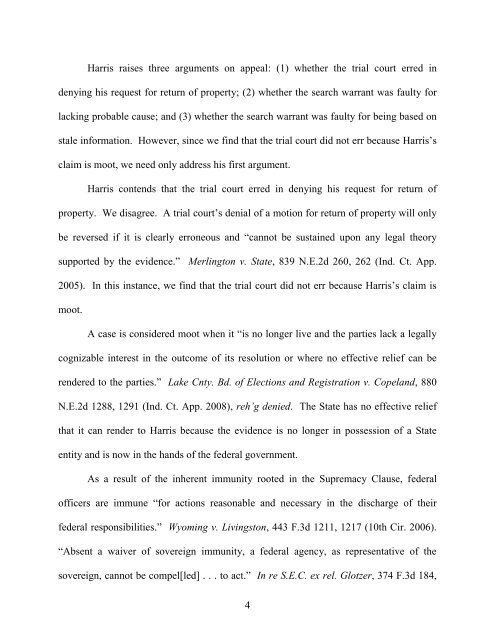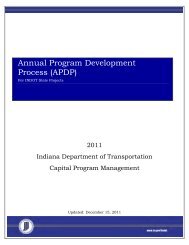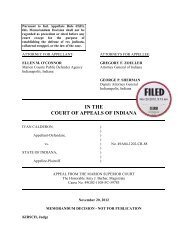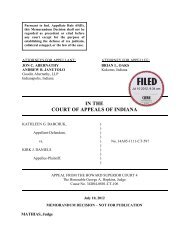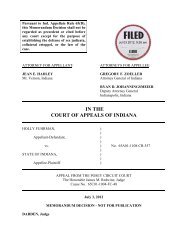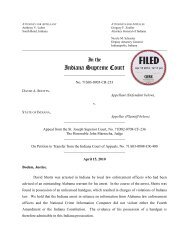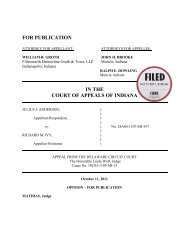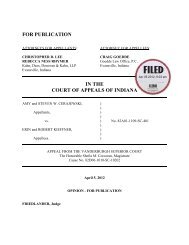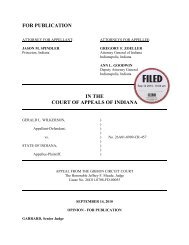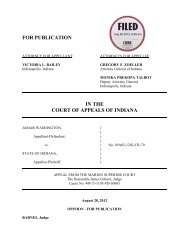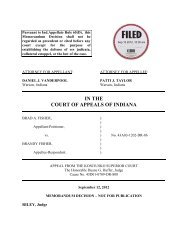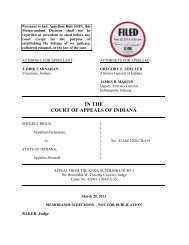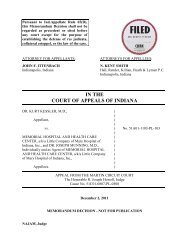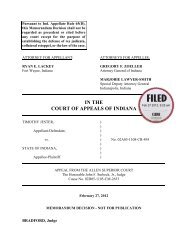Michael L. Harris v. State of Indiana, Elkhart County Sheriff's Dept.
Michael L. Harris v. State of Indiana, Elkhart County Sheriff's Dept.
Michael L. Harris v. State of Indiana, Elkhart County Sheriff's Dept.
Create successful ePaper yourself
Turn your PDF publications into a flip-book with our unique Google optimized e-Paper software.
<strong>Harris</strong> raises three arguments on appeal: (1) whether the trial court erred in<br />
denying his request for return <strong>of</strong> property; (2) whether the search warrant was faulty for<br />
lacking probable cause; and (3) whether the search warrant was faulty for being based on<br />
stale information. However, since we find that the trial court did not err because <strong>Harris</strong>’s<br />
claim is moot, we need only address his first argument.<br />
<strong>Harris</strong> contends that the trial court erred in denying his request for return <strong>of</strong><br />
property. We disagree. A trial court’s denial <strong>of</strong> a motion for return <strong>of</strong> property will only<br />
be reversed if it is clearly erroneous and “cannot be sustained upon any legal theory<br />
supported by the evidence.” Merlington v. <strong>State</strong>, 839 N.E.2d 260, 262 (Ind. Ct. App.<br />
2005). In this instance, we find that the trial court did not err because <strong>Harris</strong>’s claim is<br />
moot.<br />
A case is considered moot when it “is no longer live and the parties lack a legally<br />
cognizable interest in the outcome <strong>of</strong> its resolution or where no effective relief can be<br />
rendered to the parties.” Lake Cnty. Bd. <strong>of</strong> Elections and Registration v. Copeland, 880<br />
N.E.2d 1288, 1291 (Ind. Ct. App. 2008), reh’g denied. The <strong>State</strong> has no effective relief<br />
that it can render to <strong>Harris</strong> because the evidence is no longer in possession <strong>of</strong> a <strong>State</strong><br />
entity and is now in the hands <strong>of</strong> the federal government.<br />
As a result <strong>of</strong> the inherent immunity rooted in the Supremacy Clause, federal<br />
<strong>of</strong>ficers are immune “for actions reasonable and necessary in the discharge <strong>of</strong> their<br />
federal responsibilities.” Wyoming v. Livingston, 443 F.3d 1211, 1217 (10th Cir. 2006).<br />
“Absent a waiver <strong>of</strong> sovereign immunity, a federal agency, as representative <strong>of</strong> the<br />
sovereign, cannot be compel[led] . . . to act.” In re S.E.C. ex rel. Glotzer, 374 F.3d 184,<br />
4


